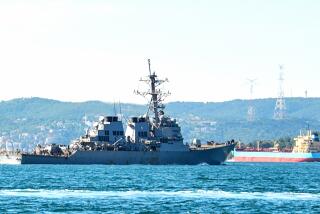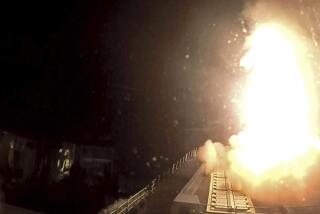U.S. Sailor Dies of Injuries in Grenade Attack in Spain
- Share via
BARCELONA, Spain — A U.S. sailor died Sunday from injuries suffered in a grenade attack that wounded nine other sailors, and separatist guerrillas claimed responsibility for the terrorist strike on a waterfront USO club packed with servicemen.
U.S. Embassy spokesman Robert Meade said Navy Seaman Ronald Strong, 20, of Reeders, Pa., died at Hospital del Mar about 4 a.m. of injuries suffered in the blast.
Nine other sailors were slightly wounded in the attack that ripped through the USO club about 6 p.m. Saturday, shattering windows, ripping out a water pipe and damaging a car parked nearby. The last of the wounded sailors was released from the hospital Sunday and returned to his ship, authorities said.
Authorities indicated they doubted the veracity of the claim of responsibility by the Catalonian Red Army of Liberation. A government spokesman said the grenades used in the attack were either Italian- or U.S.-made, leading police to believe the bombing was linked to what the spokesman called “international terrorism.”
Police were searching for a young man, described as dark with curly hair, who witnesses said tossed two grenades into the USO club in the Mediterranean port city, 400 miles northeast of Madrid, and then fled into the narrow alleyways of Barcelona’s ancient port district.
Barcelona Mayor Pasqual Maragal on Sunday called the USO attack a “detestable crime” and a “barbarous attack directed at foreigners.”
Jose Perdera Mestre, owner of the La Iruna bar, which rents space to the USO club, said the bar’s manager described the attack to him.
“She said that a young man entered the bar and in a heavy foreign accent and not speaking very good Spanish asked for tobacco,” Mestre said. “After she told him we do not sell cigarettes, he walked out, then threw the grenades into the entryway.”
Mestre said that 25 to 30 people--mostly American servicemen--were in the club when the attack occurred.
The sailors were from the destroyer Thorn and the frigate Donald B. Beary, which arrived Friday in Barcelona. Liberty for sailors on both ships has been canceled.
“We are saddened and angered that unarmed and off-duty sailors celebrating the holidays were attacked by terrorists,” State Department spokesman Ben Justesen said in Washington.
Motives Unknown
“It has not been possible to determine who carried out this attack or why they did it,” Justesen said. “Since we have not been able to determine who was responsible, we can’t attribute any motives.”
Justesen declined to comment on anti-American feelings in Spain or possible links the attack may have to U.S.-Spain negotiations on U.S. bases remaining in Spain.
Little Known of Group
Officials said they know little about the Catalonian Red Army, which has claimed responsibility for four attacks against American targets in Barcelona since surfacing in May, when it said it caused an explosion outside the offices of General Electric.
The separatists, who have never released a statement outlining their political views, set off a bomb a month later at the Barcelona offices of Hewlett-Packard. In October, they claimed responsibility for the bombing of the U.S. Consulate, in which eight people were wounded.
The four provinces of Catalonia in northeast Spain have their own language and culture and the people are highly nationalistic.
Pete Cecere, U.S. Consulate information officer in Barcelona, said anti-Americanism was evident in the port city, mostly from leftist groups pushing for the United States to dismantle its military bases in Spain.
“But it is no stronger than in other parts of Spain. It’s the fashionable thing, that’s all,” Cecere said.
More to Read
Sign up for Essential California
The most important California stories and recommendations in your inbox every morning.
You may occasionally receive promotional content from the Los Angeles Times.










